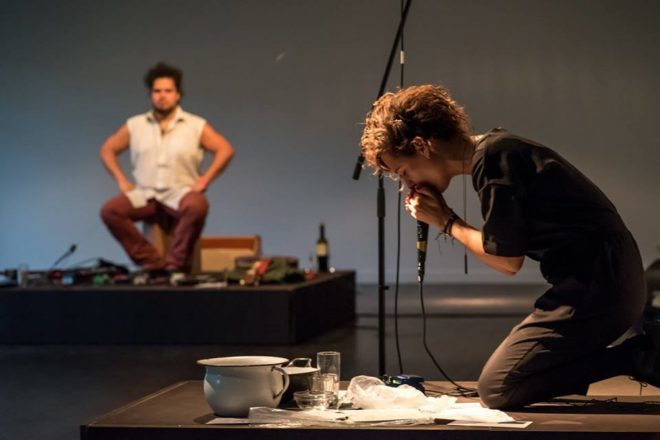Kinga Toth (1983, Sárvár, Hungary) writes and publishes short stories, poems and drama pieces in Hungarian, German and English languages. She is a musician, extensive vocalist, visual and sound poet, presenting her work at performances, exhibitions and installations. She is also a philologist and a teacher and has worked as a journalist and copy editor of art magazines, and as a cultural organizer.
Your work is pretty extensive and varied, ranging from sound poetry through performance to writing. Can you talk about these various activities and what connects them?
I can not imagine doing it differently. As a conceptualist artist, having an idea and creating new worlds do not go without having an effect on all the senses, so I love to bring together written language, sound, visuality and the performative aspect. In this world, there are always videos, visual works as graphics, montages, paintings; as for sound – there is noise, melody, punk, trash, field recordings, but also chanting and church chorales and, yes, written text and me as an instrument. These are the parts of “living text bodies”. What binds them? The message, the core idea I want to give or share.
You are a philologist. Language plays an important role in your work. Can you elaborate on the specific approaches to language that you explore in your work?
It interests me enormously what is going to happen in our brain when we “switch” languages: is it a black hole, a no man’s land, when you suddenly forget in which code system you communicate and try to fill this whole with a word from the “other” language. How do languages as organic code systems effect each other? Is it a viral attack or rather a love-making scene, a melting, or a mutation? And what kind of characteristics will the new being have? How will it sound? When I spent some time, for instance, in the Bosch research field or also in different companies in my past, I researched code language, how people only communicate with each other with those code numbers. I find this hilarious, like esperanto–and again, how will this all sound?
You are an acclaimed author as well. Can you talk about some of the themes/subjects that you explore in your literary work?
My main topics are power-grabbing, this is probably one of the key words in my work: power-grabbing and hierarchy in micro and macrocosms: domestic violence, political power, propaganda, LGBTQ-topics, the language of the “other”, the non-conform (whether it concerns age, gender, health, social class). All my book-visual-sound projects revolve around some of these topics. At the moment, I’m working on two hybrid poetry projects (in three languages at the same time, mixing them together), a visual and sound composition, also a performance.
One is about how to exist and communicate in heterotropic spaces (in “other”, “unheimlichen”, “lost” spaces) and the other is more of a feminist work – I have been working on this for five, six years. These are songs and praises of “holy” women, with chanting and a lot of surreal elements. I call this Mariamachina xx, it is my homage to these hybridmachinawomenwombs – with household objects and church melodies, fugue and chanting on the sonic level. This is also my way to express what we can do in the kitchen, how the traditional female roles lose their importance and how to show our power with humour. My country (alongside many others) is still highly male-dominated. A lot of men use “feminism” for self-promotion and still practise their power in the fields where others do not get entry. I would raise attention to the fact that getting space and sound is literally enormously important. Equality would be just so bloody great!
You are based between Hungary and Germany. Does this transitory modus operandi (lived by an increasing number of people these days) have an effect on your work?
Since 2013, I’ve been on the road. Sometimes I spend more time in a one place, but normally only for shorter periods, and of course it has an effect. Being in an in-between zone all the time, in “middle-rooms” at heterotropic spaces make you questions all the formats and definitions – which is actually a great empirical experience. Rootlessness, futuleness and heterotropia pops up in my work. This lifestyle enables me to concentrate on processes and the loss of all borders of senses, real-timeness. This is my aim, to build all of this into my new creations.
What are you currently working on?
Since the beginning of March, I’ve been on tour, doing performances, playing music, singing, giving workshops, participating at discussions, working with composers, dancers, choreographers, musicians, fine artists, having solo shows, exhibitions, book presentations and I’m also giving lectures and workshop at universities in different languages – until the middle of July. All of those activities are completely in different formats and in different languages – which does not mean that I don’t compose and write. In between, I’m also working on my new project, NEUHAUT with Antony Rajzhekov. This is a dialogue installation which works with heterotropic spaces (live composition, sound, visuality).
I also work on my own project, CORNSONGS, about a lost society, a culture group, that is trying to communicate with the other world but all that can be can reached is their own entity. The texts are trilingual – Hungarian, German and English. I’ve been working on hybrid writing for quite a while, and the other solo project is entitled MariaMachina XX and it also employs hybrid texts and performance. I also develop my solo performance, where I make “etudes” with video-sound-performative work. And of course, playing music and making noise now with artists from Berlin and Graz. Besides, I’m also working on international projects, creating exchange programmes, teaching and developing.
